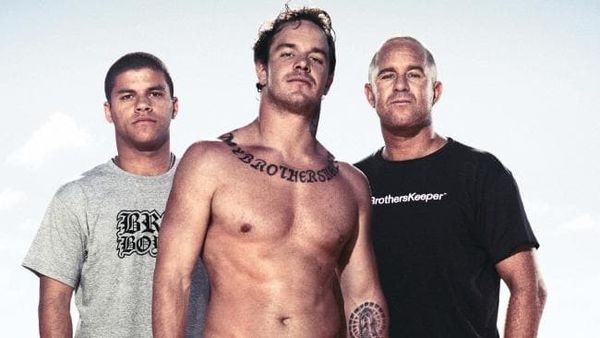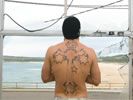Eye For Film >> Movies >> Bra Boys (2007) Film Review
Bra Boys
Reviewed by: Amber Wilkinson

Whether you feel that this documentary about the surfing tribe of Maroubra Beach is a celebration of high-energy brotherhood in the face of adversity or a glorification of some of the less appealing laddish aspects of youth culture there is no denying its wave of sheer enthusiasm is appealing.
Shot by Sunny Abberton (with the help of fellow surfer Macario De Souza) the film traces the roots of the Bra Boys, named after the 'bra' in Maroubra, rather than a piece of ladies' lingerie. They are youngsters who, mostly as an escape from the spectre of broken homes and drug addicted parents, came together to form their 'tribe' through a love of the surf. As Sunny puts it: "Surf has saved so many kids. Led them to a life in the sea, instead of a life of crime."

Sunny is the eldest of the four Abberton boys and, it seems, almost a surrogate dad to the others, Jai, Koby and Dakota, since their actual dads (the boys share two) were not on the scene when they were kids. Instead, they shared a home with their addict mother - conspicuous by her absence from this film - and her violent partner. Their background appears to not be uncommon in the Maroubra Beach area, where Government housing (ie sink estates/schemes) abounds and the chief landmark is the local prison.
As a result, the kids found a kind of refuge with their Gran, who allowed not only them, but a whole host of other youngsters more or less free rein in her home. It was from these small beginnings, coupled with a love of the surf and healthy disrespect for their own mortality that the Bra Boys - motto "my brother's keeper" - were born.
As the film progresses it becomes clear that the tribe's (they don't like the term gang) definition of 'no fear' is virtually synonymous with the word 'suicidal' as they attempt giants that no one else will tackle, all for the love of the sport.
This is not simply a tale of surfer dudes watching each other's back, however. It is also an attempt to present the Bra Boys in a more favourable light than they are often seen - their somewhat cavalier attitude where surfing is concerned also extends to their regard for the law when it comes to raising a party. Rather than shying away from the risky high jinks, however, Abberton's film does acknowledge the boisterous side of their activities in and out of the water. But, importantly, it also gives a sense of real community that is offered to youngsters by the Bra Boys, an alternative lifestyle - where fitness and fellowship come first - to that offered by drugs or crime.
Despite these postives, however, there is no denying the Bra Boys frequently clash with the law. Documented here is a brawl at a birthday party, which left a slew of police injured and, crucially, the trial of Jai and Koby Abberton - charged with murder of a fellow Bra Boy and for being an accessory after the fact, respectively. As they battle through the courts to try to clear their names - citing that the death was a tragic accident rather than premeditated - Sunny's camera follows them. Again, this is heartfelt, but in some ways it detracts from the more interesting bigger picture - the history of surfing in the area.
Russell Crowe's narration is, by comparison to the knockabout energy of the surfers, disappointingly flat. He sounds as though he is reading directly from a script and fails to breathe any life into his words. The editing, too, is rough around the edges, but somehow it seems to fit the subject matter. Ultimately, the attraction lies in the energy of the surfers, exemplified by some highly impressive, if roughly cut, footage of them riding giants. It may be brash and a slightly biased but it nonetheless offers a fascinating insight into this surfing society, with a level of realism, access to the tribe and heart that you simply wouldn't get if this had been shot by a more 'professional' outsider.
Reviewed on: 05 Mar 2008

















